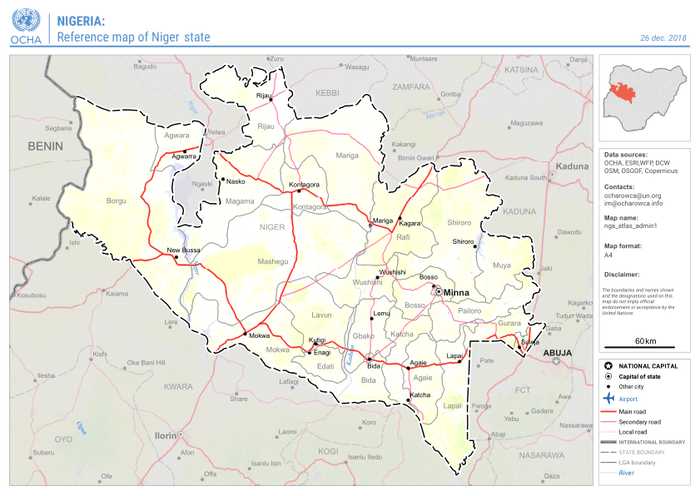Niger
Niger State, situated in central Nigeria, is characterized by its vast landmass, diverse ethnic groups, and rich agricultural resources. With a growing economy driven by agriculture, mining, and hydroelectric power generation, the state is focusing on infrastructure development to support its burgeoning population.

Niger State, centrally located in Nigeria, stands as a vast expanse of land characterized by its diverse ethnic groups, fertile agricultural lands, and abundant natural resources. The state's economy thrives on a diverse range of sectors, including agriculture, mining, and hydroelectric power generation, contributing to its significance as a hub of economic activity and cultural diversity.
Agriculture forms the backbone of Niger State's economy, with its fertile soils and favorable climate supporting the cultivation of a wide variety of crops such as maize, millet, rice, yams, and vegetables. The state's agricultural output not only ensures food security for its residents but also serves as a major source of revenue through local consumption and exportation.
Furthermore, Niger State is endowed with rich mineral resources, including gold, limestone, gypsum, and iron ore, which contribute to the state's economic prosperity through mining activities. The mining sector provides employment opportunities and generates revenue for the state, contributing to its economic growth and development.
Moreover, Niger State is home to several hydroelectric power stations, including the iconic Kainji Dam, which harnesses the waters of the Niger River for electricity generation. The state's hydroelectric power generation capacity plays a crucial role in meeting the energy needs of Nigeria and the West African region, contributing to its economic stability and growth.
In addition to its economic endeavors, Niger State is focusing on infrastructure development to support its burgeoning population and enhance its socio-economic development. Investments in roads, bridges, healthcare facilities, education, and other essential services are essential to improving the quality of life for its residents and fostering economic growth.
Despite its economic potential and natural resources, Niger State faces challenges such as poverty, unemployment, and inadequate infrastructure. However, the state's government is committed to addressing these challenges through strategic planning, policy initiatives, and partnerships with the private sector and development partners.
As Niger State continues to harness its agricultural resources, mineral wealth, and hydroelectric power generation capacity, it remains poised for growth and development. With a focus on infrastructure development, sustainable economic policies, and inclusive governance, Niger State is destined to emerge as a beacon of progress and prosperity in central Nigeria.

- Capital Minna
- Country Nigeria
- Created
- Population 6500000
- Official Languages Nupe, Gbagyi, Hausa, Yoruba
- Ethnic Groups Nupe, Gbagyi, Hausa, Yoruba, Kamuku, Kambari
- Land Area 76
- Postal Code 920001



